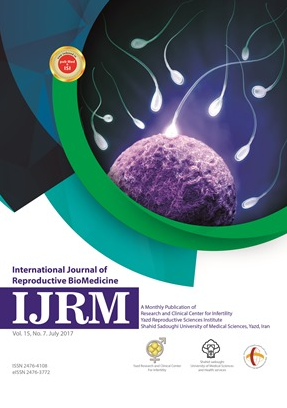
International Journal of Reproductive BioMedicine
ISSN: 2476-3772
The latest discoveries in all areas of reproduction and reproductive technology.
Repeated use of medications for ovulation induction after unsuccessful treatment: A cause of concern for infertile couples
Published date: Jan 26 2020
Journal Title: International Journal of Reproductive BioMedicine
Issue title: International Journal of Reproductive BioMedicine (IJRM): Volume 18, Issue No. 1
Pages: 73-76
Authors:
Abstract:
This is a Letter to Editor and does not have an abstract.
References:
[1] Farquhar C, Marjoribanks J. Assisted reproductive technology: an overview of Cochrane reviews Cochrane Database Syst Rev 2018; 8: CD010537.
[2] Golmakani N, Ebrahimzadeh Zagami S, Esmaily H, Vatanchi A, Kabirian M. The relationship of the psychological coping and adjustment strategies of infertile women with the success of assisted reproductive technology. Int J Reprod Biomed 2019; 17: 119–126.
[3] Hoorsan H, Mirmiran P, Chaichian S, Moradi Y, Hoorsan R, Jesmi F. Congenital malformations in infants of mothers undergoing assisted reproductive technologies: A systematic review and meta-analysis study. J Prev Med Public Health 2017; 50: 347–360.
[4] Ebrahimzadeh Zagami S, Latifnejad Roudsari R, Janghorban R, Mousavi Bazaz SM, Amirian M, Allan HT. A Qualitative Study of the Challenges Experienced by Iranian Infertile Couples After Unsuccessful Assisted Reproductive Technologies. International Journal of Women’s Health and Reproduction Sciences 2019; 7: 331–338.
[5] Abou Arkoub R, Xiao CW, Claman P, Clark EG. Acute kidney injury due to ovarian hyperstimulation syndrome. Am J Kidney Dis 2019; 73: 416–420.
[6] Danolic D, Kasum M, Puljiz M, Alvir I, Tomica D, Mamic I, et al. The risk of hypercoagulability in ovarian hyperstimulation syndrome. Acta Clin Croat 2015; 54: 186–192.
[7] Ranjbar F, Behboodi-Moghadam Z, Borimnejad L, Ghaffari SR, Akhondi MM. Experiences of infertile women seeking assisted pregnancy in iran: A qualitative study. J Reprod Infertil 2015; 16: 221–228.
[8] Afshani SA, Abdoli AM, Hashempour M, Baghbeheshti M, Zolfaghari M. The attitudes of infertile couples towards assisted reproductive techniques in Yazd, Iran: A cross-sectional study in 2014. Int J Reprod Biomed 2016; 14: 761–768.
[9] Farhangniya M, Dortaj Rabori E, Mozafari Kermani R, Haghdoost AA, Bahrampour A, Bagheri P, et al. Comparison of congenital abnormalities of infants conceived by assisted reproductive techniques versus infants with natural conception in Tehran. Int J Fertil Steril 2013; 7: 217–224.
[10] Ahmadi SE, Mozafari R, Gourabi H, Ashrafi M, Shahzadeh Fazeli SA, Nateghi MR, et al. Female infertility: frequency of hearing defect and ear abnormalities in newborns conceived by assisted reproductive techniques in Royan institute. International Journal of Fertility and Sterility 2011; 5: 64.
[11] Mussa A, Molinatto C, Cerrato F, Palumbo O, Carella M, Baldassarre G, et al. Assisted reproductive techniques and risk of Beckwith-Wiedemann syndrome. Pediatrics 2017; 140: 1–10.
[12] Karami M, Jenabi E, Fereidooni B. The association of placenta previa and assisted reproductive techniques: a meta-analysis. J Matern Fetal Neonatal Med 2018; 31: 1940–1947.
[13] Omani-Samani R, Alizadeh A, Almasi-Hashiani A, Mohammadi M, Maroufizadeh S, Navid B, et al. Risk of preeclampsia following assisted reproductive technology: systematic review and meta-analysis of 72 cohort studies. J Matern Fetal Neonatal Med 2018; 18: 331.
[14] Yazdani F, Elyasi F, Peyvandi S, Moosazadeh M, Galekolaee KS, Kalantari F, et al. Counseling-supportive interventions to decrease infertile women’s perceived stress: A systematic review. Electron Physician 2017; 9: 4694–4702.
[15] Latifnejad Roudsari R, Rasolzadeh Bidgoly M, Mousavifar N, Modarres Gharavi M. The effect of collaborative counseling on perceived infertility-related stress in infertile women undergoing IVF. Iranian Journal of Obstetrics Gynecology Infertility 2011; 14: 22–31. (in Persian)
[16] Latifnejad Roudsari R, Allan HT, Smith PA. Iranian and English women’s use of religion and spirituality as resources for coping with infertility. Hum Fertil 2014; 17: 114–123.
[17] Rasoulzadeh Bidgoli M, Latifnejad Roudsari R. The effect of the collaborative infertility counseling model on coping strategies in infertile women undergoing in vitro fertilization: A randomized controlled trial. International Journal of Women's Health and Reproduction Sciences 2018; 6: 47–54.